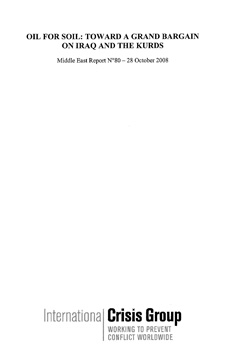|
OIL FOR SOIL: TOWARD A GRAND BARGAIN ON IRAQ AND THE KURDS
EXECUTIVE SUMMARY AND RECOMMENIDATIONS
A long-festering conflict over Kirkuk and other disputed territories is threatening to disrupt the current fragile relative peace in Iraq by blocking legislative progress and political accommodation. Two events in particular stand out: a two-month stalemate in July-September in negotiations over a provincial elections law in which Kirkuk's unresolved status was the principal obstacle and, during this period, a campaign by the Iraqi army in and around the Kurdish-controlled disputed district of Khanaqin. To avoid a breakdown over the issue of Kirkuk, the current piecemeal approach should be discarded in favour of a gland bargain involving all core issues: Kirkuk and other disputed territories, revenue sharing and the hydrocarbons law, as well as federalism and constitutional revisions.
Despite some progress, Iraq's legislative agenda, promoted by the U.S. in order to capitalise on recent security gains, is bogged down. The main culprit is a dispute over territories claimed by the Kurds as historically belonging to Kurdistan - territories that contain as much as 13 per cent of lraq's proven oil reserves. This conflict reflects a deep schism between Arabs and Kurds that began with the creation of modern Iraq after World War I; has simmered for decades, marked by intermittent conflict and accommodation; and was revitalised due to the vacuum and resulting opportunities generated by the Baath regime's demise in 2003. In its ethnically-driven intensity, ability to drag in regional players such as Turkey and lran and potentially devastating impact on efforts to rebuild a fragmented state, it matches and arguably exceeds the Sunni-Shiite divide that spawned the 2005 - 2007 sectarian war.
Stymied in their quest to incorporate disputed territories into the Kurdistan region by constitutional means, Kurdish leaders have signalled their intent to hold politics in Baghdad hostage to their demands. At the same time, the Iraqi government's growing military assertiveness is challenging the Kurds' de facto control over these territories. Rising acrimony and frustration are jeopardising the current relative peace, undermining prospects for national unity and, in the longer term, threatening Iraq's territorial integrity.
Rather than items that can be individually and sequentially addressed, Iraq's principal conflicts - concerning oil, disputed territories, federalism and constitutional revisions - have become thoroughly interwoven. Federalism cannot be implemented without agreement on how the oil industry will be managed and revenues will be distributed. Progress on a federal hydrocarbons law and a companion revenue-sharing law is inconceivable without agreement on the disposition of disputed territories that boast major oil fields, such as Kirkuk. And the constitution review has faltered over failure to settle all those questions, the solutions to which will need to be reflected in amendments reached by consensus.
How to move forward? If there is a way out, it lies in a comprehensive approach that takes into account the principal stakeholders' core requirements. A sober assessment of these requirements suggests a possible package deal revolving around a fundamental "oil-for soil" trade-off: in exchange for at least deferring their exclusive claim on Kirkuk for ten years, the Kurds would obtain demarcation and security guarantees for their internal boundary with the lest of Iraq, as well as the right to manage and profit from their own mineral wealth. Such a deal would codify the significant gains the Kurds have made since they achieved limited autonomy in the wake of the 1991 Gulf War and especially after April 2003, while simultaneously respecting an Arab-Iraqi - as well as neighbouring states' - red line regarding Kirkuk.
This package entails painful concessions from all sides, which they are unlikely to make without strong international involvement. The UN Assistance Mission for Iraq (LINAMI) has been providing technical support on a range of issues and, since late 2007 , has devoted the bulk of its efforts to the question of disputed internal boundaries. It will need stronger backing from the U.S. and its allies, which have an abiding interest in Iraq's stabilisation yet have played a passive bystander role ...
| 